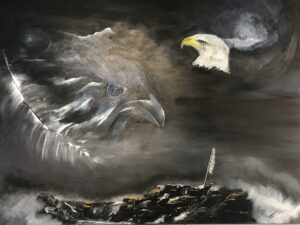Honouring Indigenous Peoples on this Day

Kwey Kakina
Asema niwi bigidnā
Kichi Mīgwech ndi kid bīdābung ensa kījeb
Kichi Mīgwech ndi kid ondji shki kījigak
Ni Kichi Mīgwechwindam ondji bimādiziwin
Ni Kichi Mīgwechwindam kina gegō kwenādjiwang
Kichi Mīgwech ndi kid ondji asemā gamijyang wii ayamiyewiyāong
Hello all
Today I offer my tobacco
I say thank you for the sunrise each morning
I say thank you for a new day
I say thank you for a new life
I say thank you for everything that is beautiful
I say thank you for the gift of tobacco that lets us pray
Scholars estimate there were between 10-15 million First Nations and Inuit living in the northern part (what is now referred to as Canada) of Turtle Island pre-contact. From the 2016 Census there were 1.6 million First Nation, Inuit and Métis peoples in Canada. This is slightly higher than the population of Canada’s capital city spread across this nation.
When settlers first arrived on the shores of our land, they didn’t understand our way of life. First Nations believe that their values and traditions are gifts from the Creator. One of the most important and most common teachings was that people should live in harmony with the natural world and all it contained. There are countless spirit beings. We look for natural medicines. We hold ceremony for wellbeing and a wholistic, circular thinking. Our knowledge comes from Spirit and it is our duty to protect Mother Earth. Whereas a western view knowledge comes from science, with manufactured medicines, where the thinking is linear to exploit the Earth for monetary gain and there is religious worship with one God.
The misunderstandings from the western viewpoint of a monetary economic system and wealth would equal rich with assets, a focus on human gain, greed and a need for control. Settlers landed on Turtle Island, overcame the nations and made false promises to live in harmony and share these lands. Our way of life would be forever altered from greed, from men having no honour and from the lens of wanting power and control over another for their own interests.
People can choose to look at history, at everything that went wrong, all the harm caused by the actions of others and remain living within it. We know the history and if you don’t, where have you been?
In my lifetime I’ve been referred to as Indian, Aboriginal, First Nations and now Indigenous. I’ve been abused, mistreated, misunderstood, harassed, and threatened simply because I am First Nations.
Over the years, I’ve learned to navigate and walk between two worlds. At times at the cost of rejection from my own Nation and unacceptance in western society. Like many, I felt alone and struggled to simply be.
At the beginning I wrote in my language. First Nations culture was never intended to be written. It is in oral stories that Elders pass on from one generation to another. We learned how the world came into being and that we were a part of the whole of creation. People gave thanks to everything in nature, upon which they depended for survival. Everything they needed was provided, development as individuals and as members of their communities. First Nations treated all objects in their environment with the utmost respect.
First Nations people have deep respect for every thing, and every process in the natural world is reflected in song, dance, and ceremony. I choose to walk my own path, to live outside of history and not carry it forward with me.
I am not a victim because I am an Indian. Omamawinini Anishinaabe inini nidaaw. I am an Algonquin native man. I walk proud in my spirituality. I am grounded in who I am.
I am.
Today the government chooses to recognize this day as Indigenous Peoples Day. Every day, when I honour Mother Earth and all who inhabits her, is an acknowledgement of my ancestors and to my culture. We are all one, past, present and future.
On this 26th colonial anniversary of Indigenous Peoples day (formally National Aboriginal Day declared in 1996 and ironically the same year the last Residential School was closed) I ask that you reflect on how you walk in this world. Whether you are Indigenous or non-Indigenous, spiritual, religious or neither, are you carrying the past with you? Look within, listen closely and hear your own heartbeat as though it was the heartbeat of Mother Earth, lay down your tobacco and give thanks, today and every day. Be grateful to every blade of grass, for the ant as it rushes past you, for your children and the people who surround who are now your teachers, your home, the air, to the Creator for providing what you need and be grateful for who you are and the gifts you have to offer.
Miigwech
By Connor Sarazin. Connor is the KAIROS Blanket Exercise Communications & Partnerships Coordinator.
Image of a painting by Connor Sarazin: Listening to the Ancestors.








